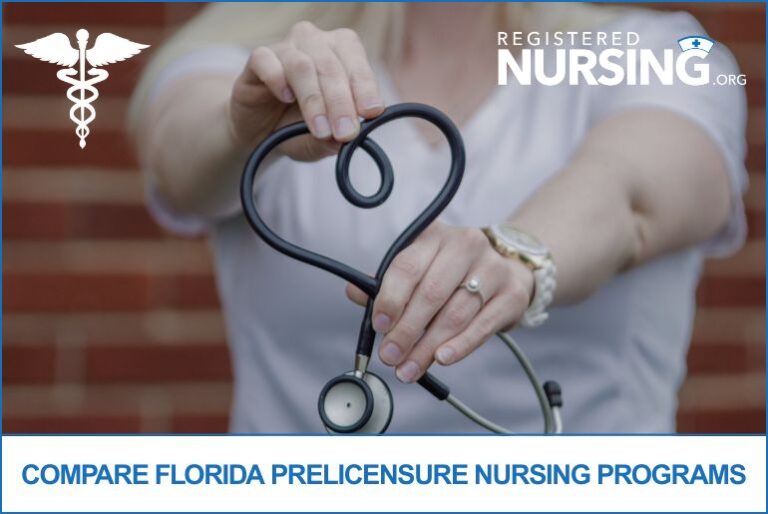Compare Florida Prelicensure Nursing Programs: Your Guide to Choosing the Right Path
- Understanding Florida’s Prelicensure Nursing Programs
- Comparing Top Florida Prelicensure Nursing Programs
- Accreditation and Approval: What They Mean
- NCLEX Pass Rates: A Critical Indicator
- Program Formats: Flexibility and Learning Styles
- Financial Considerations: Tuition and Aid
- Making an Informed Decision
- Next Steps in Your Nursing Journey
- Sources
- Latest Articles & Guides

Florida is home to over 350 prelicensure nursing programs, offering aspiring nurses a wide array of educational pathways. However, with first-time NCLEX-RN pass rates in the state falling below the national average—76.75% in 2023 compared to 88.56% nationally (Florida Center for Nursing)—it’s crucial to carefully evaluate programs to ensure they provide the education and support needed for success. This guide will help you navigate the options and make informed decisions about your nursing education in Florida.
Understanding Florida’s Prelicensure Nursing Programs
Prelicensure nursing programs in Florida are designed for individuals seeking to become Registered Nurses (RNs) or Licensed Practical Nurses (LPNs). These programs are categorized as:
- Associate Degree in Nursing (ADN): Typically a 2-year program offered at community colleges.
- Bachelor of Science in Nursing (BSN): A 4-year degree providing comprehensive nursing education.
- Accelerated BSN (ABSN): For individuals with a non-nursing bachelor’s degree, usually completed in 12–18 months.
- Direct Entry MSN: For those with a non-nursing bachelor’s degree seeking a Master’s in Nursing.
Each program type has its own prerequisites, length, clinical requirements, and career outcomes, making it essential to understand how each aligns with your personal and professional goals.
- ADN (Associate Degree in Nursing): Requires a high school diploma or GED and may include prerequisite courses in anatomy, microbiology, and chemistry. These programs typically take 2 to 3 years to complete and prepare graduates for entry-level RN roles. ADN-prepared nurses often begin working sooner and may later pursue an RN to BSN program to advance.
- BSN (Bachelor of Science in Nursing): In addition to a high school diploma, applicants may need to complete general education courses and meet GPA requirements. BSN programs last about 4 years and include extensive coursework in leadership, public health, and nursing research. Graduates are well-prepared for a broader range of roles, including supervisory and specialty positions, and are preferred by many employers.
- Accelerated BSN (ABSN): Designed for those who already hold a non-nursing bachelor's degree, these intensive programs compress nursing education into 12–18 months. While fast-paced, they provide the same eligibility for licensure as traditional BSN programs. Strong time management and prior academic success are often required.
- Direct Entry MSN: For career changers with a non-nursing bachelor's degree, these programs allow students to earn a master's degree and qualify for RN licensure in about 2 to 3 years. Some tracks may prepare students for advanced practice roles or leadership positions.
Understanding these distinctions will help you choose a program that fits your current education level, lifestyle, and long-term ambitions in nursing.
Comparing Top Florida Prelicensure Nursing Programs
When evaluating nursing programs, consider factors such as accreditation, NCLEX pass rates, tuition, and program format. Below is a comparison of some notable programs in Florida:
| Program Name | Location | Degree Type | NCLEX-RN Pass Rate (2023) | Accreditation | Tuition (In-State) |
| Florida State University | Tallahassee | BSN | 97.8% | CCNE | Varies |
| Nova Southeastern University | Fort Lauderdale | BSN | Up to 92% | CCNE | Varies |
| Florida Gulf Coast University | Fort Myers | BSN | Not specified | CCNE | Varies |
| University of South Florida | Tampa | BSN | Not specified | CCNE | Approximately $8,700 |
| HCA Florida Mercy Hospital College | Miami | ADN | 64.6% (2022) | ACEN | Varies |
Note: Tuition varies based on residency status and program specifics. Always consult the program’s official website for the most accurate information.
Accreditation and Approval: What They Mean
In Florida, nursing programs can be “approved” by the Florida Board of Nursing or “accredited” by national agencies such as the Commission on Collegiate Nursing Education (CCNE) or the Accreditation Commission for Education in Nursing (ACEN). An approved program meets the state’s minimum requirements, while accreditation signifies that a program meets higher national standards. Choosing an accredited program can enhance your employment prospects and ensure a higher quality education. (Florida Board of Nursing)
NCLEX Pass Rates: A Critical Indicator
The NCLEX-RN pass rate is a vital metric indicating how well a program prepares its students for nursing licensure. Florida’s average first-time NCLEX-RN pass rate in 2023 was 76.75%, below the national average of 88.56%. (Florida Center for Nursing) Programs with consistently high pass rates are often better at equipping students with the knowledge and skills needed to succeed.
Program Formats: Flexibility and Learning Styles
Florida offers various program formats to accommodate different learning preferences and schedules:
- Traditional On-Campus Programs: Structured schedules with in-person classes and clinicals.
- Hybrid Programs: A combination of online coursework and in-person clinical experiences.
- Online Programs: Primarily online coursework with local clinical placements.
For example, the University of South Florida offers hybrid MSN to Post-Graduate Certificate programs, providing flexibility for working professionals.
Financial Considerations: Tuition and Aid
Tuition costs vary widely among Florida’s nursing programs. Public institutions generally offer lower in-state tuition rates, while private institutions may have higher costs. Financial aid options, including scholarships, grants, and loan forgiveness programs, can help offset expenses. It’s essential to research each program’s tuition fees and available financial aid to make an informed decision.
Making an Informed Decision
Selecting the right nursing program involves evaluating multiple factors:
- Accreditation and Approval Status: Ensure the program is accredited and approved.
- NCLEX Pass Rates: Higher pass rates often indicate better preparation.
- Program Format: Choose a format that fits your lifestyle and learning preferences.
- Tuition and Financial Aid: Consider the total cost and available financial support.
- Location and Clinical Opportunities: Proximity to clinical sites can impact your hands-on experience.
Utilize resources like the Florida Board of Nursing’s Compare Florida Prelicensure Nursing Education Programs tool to compare programs based on your specific criteria.
Next Steps in Your Nursing Journey
Once you’ve selected a program, prepare for the application process by gathering necessary documents, meeting prerequisites, and understanding deadlines. After admission, focus on excelling academically and gaining valuable clinical experience. Post-graduation, you’ll need to pass the NCLEX-RN to obtain licensure. Consider exploring advanced degrees or certifications to further your career.
For more information on nursing education and career advancement, visit RegisteredNursing.org’s resources on RN to BSN programs.
Sources
- Florida Center for Nursing. 2023 NCLEX Report
- Florida Board of Nursing. Nursing Program Portal
- Florida Department of Health. Compare Florida Prelicensure Nursing Education Programs
Latest Articles & Guides
One of the keys to success as a registered nurse is embracing lifelong learning. Our articles and guides address hot topics and current events in nursing, from education to career mobility and beyond. No matter where you are on your nursing journey, there’s an article to help you build your knowledge base.
Browse our latest articles, curated specifically for modern nurses.



